- Home
- Margaret Atwood
Good Bones and Simple Murders Page 7
Good Bones and Simple Murders Read online
Page 7
Everyone knew what that meant.
This is a traditional German fairy tale.
*
The loaf of bread I have conjured for you floats about a foot above your kitchen table. The table is normal, there are no trapdoors in it. A blue tea towel floats beneath the bread, and there are no strings attaching the cloth to the bread or the bread to the ceiling or the table to the cloth, you've proved it by passing your hand above and below. You didn't touch the bread though. What stopped you? You don't want to know whether the bread is real or whether it's just a hallucination I've somehow duped you into seeing. There's no doubt that you can see the bread, you can even smell it, it smells like yeast, and it looks solid enough, solid as your own arm. But can you trust it? Can you eat it? You don't want to know, imagine that.
POPPIES:
Three
Variations
In Flanders fields the poppies blow
Between the crosses, row on row.
That mark our place; and in the sky
The larks, still bravely singing, fly
Scarce heard amid the guns below.
--John McCrae
1.
I had an uncle once who served in Flanders. Flanders, or was it France? I'm old enough to have had the uncle but not old enough to remember. Wherever, those fields are green again, and plowed and harvested, though they keep throwing up rusty shells, broken skulls. The uncle wore a beret and marched in parades, though slowly. We always bought those felt poppies, which aren't even felt any more, but plastic: small red explosions pinned to your chest, like a blow to the heart. Between the other thoughts, that one crosses my mind. And the tiny lead soldiers in the shop windows, row on row of them, not lead any more, too poisonous, but every detail perfect, and from every part of the world: India, Africa, China, America. That goes to show, about war--in retrospect it becomes glamour, or else a game we think we could have played better. From time to time the stores mark them down, you can get bargains. There are some for us, too, with our new leafy flag, not the red rusted-blood one the men fought under. That uncle had placemats with the old flag, and cups and saucers. The planes in the sky were tiny then, almost comical, like kites with wind-up motors; I've seen them in movies. The uncle said he never saw the larks. Too much smoke, or fog. Too much roaring, though on some mornings it was very still. Those were the most dangerous. You hoped you would act bravely when the moment came, you kept up your courage by singing. There was a kind of fly that bred in the corpses, there were thousands of them he said; and during the bombardments you could scarce hear yourself think. Though sometimes you heard things anyway: the man beside him whispered, "Look," and when he looked there was no more torso: just a red hole, a wet splotch in midair. That uncle's gone now too, the number of vets in the parade is smaller each year, they limp more. But in the windows the soldiers multiply, so clean and colorfully painted, with their little intricate guns, their shining boots, their faces, brown or pink or yellow, neither smiling nor frowning. It's strange to think how many soldiers like that have been owned over the years, loved over the years, lost over the years, in back yards or through gaps in porch floors. They're lying down there, under our feet in the garden and below the floorboards, armless or legless, faces worn half away, listening to everything we say, waiting to be dug up.
2.
Cup of coffee, the usual morning drug. He's off jogging, told her she shouldn't be so sluggish, but she can't get organized, it involves too many things: the right shoes, the right outfit, and then worrying about how your bum looks, wobbling along the street. She couldn't do it alone anyway, she might get mugged. So instead she's sitting remembering how much she can no longer remember, of who she used to be, who she thought she would turn into when she grew up. We are the dead: that's about the only line left from In Flanders Fields, which she had to write out twenty times on the blackboard, for talking. When she was ten and thin, and now see. He says she should go vegetarian, like him, healthy as lettuce. She'd rather eat poppies, get the opiates straight from the source. Eat daffodils, the poisonous bulb like an onion. Or better, slice it into his soup. He'll blow his nose on her once too often, and then. Between the rock and the hard cheese, that's where she sits, inert as a prisoner, making little crosses on the wall, like knitting, counting the stitches row on row, that old trick to mark off the days. Our place, he calls this dump. He should speak for himself, she's just the mattress around here, she's just the cleaning lady, and when he ever lifts a finger there'll be sweet pie in the sky. She should burn the whole thing down, just for larks; still, however bravely she may talk, to herself, where would she go after that, what would she do? She thinks of the bunch of young men they saw, downtown at night, where they'd gone to dinner, his birthday. High on something, singing out of tune, one guy's fly half open. Freedom. Catch a woman doing that, panty alert, she'd be jumped by every creep within a mile. Too late to make yourself scarce, once they get the skirt up. She's heard of a case like that, in a poolhall or somewhere. That's what keeps her in here, in this house, that's what keeps her tethered. It's not a midlife crisis, which is what he says. It's fear, pure and simple. Hard to rise above it. Rise above, like a balloon or the cream on milk, as if all it takes is hot air or fat. Or willpower. But the reason for that fear exists, it can't be wished away. What she'd need in real life is a few guns. That and the technique, how to use them. And the guts, of course. She pours herself another cup of coffee. That's her big fault: she might have the gun but she wouldn't pull the trigger. She'd never be able to hit a man below the belt.
3.
In school, when I first heard the word Flanders I thought it was what nightgowns were made of. And pajamas. But then I found it was a war, more important to us than others perhaps because our grandfathers were in it, maybe, or at least some sort of ancestor. The trenches, the fields of mud, the barbed wire, became our memories as well. But only for a time. Photographs fade, the rain eats away at statues, the neurons in our brains blink out one by one, and goodbye to vocabulary. We have other things to think about, we have lives to get on with. Today I planted five poppies in the front yard, orangey-pink, a new hybrid. They'll go well with the marguerites. Terrorists blow up airports, lovers slide blindly in between the sheets, in the soft green drizzle my cat crosses the street; in the spring regatta the young men row on, row on, as if nothing has happened since 1913, and the crowds wave and enjoy their tall drinks with cucumber and gin. What's wrong with that? We can scrape by, more or less, getting from year to year with hardly a mark on us, as long as we know our place, don't mouth off too much or cause uproars. A little sex, a little gardening, flush toilets and similar discreet pleasures; and in the sky the satellites go over, keeping a bright eye on us. The ospreys, the horned larks, the shrikes and the woodland warblers are having a thinner time of it, though still bravely trying to nest in the lacunae left by pesticides, the sharp blades of the reapers. If it's singing you want, there's lots of that, you can tune in any time; coming out of your airplane seatmate's earphones it sounds like a fly buzzing, it can drive you crazy. So can the news. Disaster sells beer, and this month hurricanes are the fashion, and famines: scarce this, scarce that, too little water, too much sun. With every meal you take huge bites of guilt. The excitement in the disembodied voices says: you heard it here first. Such a commotion in the mid-brain! Try meditation instead, be thankful for the annuals, for the smaller mercies. You listen, you listen to the moonlight, to the earthworms reveling in the lawn, you celebrate your own quick heartbeat. But below all that there's another sound, a groundswell, a drone, you can't get rid of it. It's the guns, which have never stopped, just moved around. It's the guns, still firing monotonously, bored with themselves but deadly, deadlier, deadliest, it's the guns, an undertone beneath each ordinary tender conversation. Say pass the sugar and you hear the guns. Say I love you. Put your ear against skin: below thought, below memory, below everything, the guns.
HOMELANDING
1.
Where shou
ld I begin? After all, you have never been there; or if you have, you may not have understood the significance of what you saw, or thought you saw. A window is a window, but there is looking out and looking in. The native you glimpsed, disappearing behind the curtain, or into the bushes, or down the manhole in the main street--my people are shy--may have been only your reflection in the glass. My country specializes in such illusions.
2.
Let me propose myself as typical. I walk upright on two legs, and have in addition two arms, with ten appendages, that is to say, five at the end of each. On the top of my head, but not on the front, there is an odd growth, like a species of seaweed. Some think this is a kind of fur, others consider it modified feathers, evolved perhaps from scales like those of lizards. It serves no functional purpose and is probably decorative.
My eyes are situated in my head, which also possesses two small holes for the entrance and exit of air, the invisible fluid we swim in, and one larger hole, equipped with bony protuberances called teeth, by means of which I destroy and assimilate certain parts of my surroundings and change them into my self. This is called eating. The things I eat include roots, berries, nuts, fruits, leaves, and the muscle tissues of various animals and fish. Sometimes I eat their brains and glands as well. I do not as a rule eat insects, grubs, eyeballs, or the snouts of pigs, though these are eaten with relish in other countries.
3.
Some of my people have a pointed but boneless external appendage, in the front, below the navel or midpoint. Others do not. Debate about whether the possession of such a thing is an advantage or a disadvantage is still going on. If this item is lacking, and in its place there is a pocket or inner cavern in which fresh members of our community are grown, it is considered impolite to mention it openly to strangers. I tell you this because it is the breach of etiquette most commonly made by tourists.
In some of our more private gatherings, the absence of cavern or prong is politely overlooked, like club feet or blindness. But sometimes a prong and a cavern will collaborate in a dance, or illusion, using mirrors and water, which is always absorbing for the performers but frequently grotesque for the observers. I notice that you have similar customs.
Whole conventions and a great deal of time have recently been devoted to discussions of this state of affairs. The prong people tell the cavern people that the latter are not people at all and are in reality more akin to dogs or potatoes, and the cavern people abuse the prong people for their obsession with images of poking, thrusting, probing, and stabbing. Any long object with a hole at the end, out of which various projectiles can be shot, delights them.
I myself--I am a cavern person--find it a relief not to have to worry about climbing over barbed wire fences or getting caught in zippers.
But that is enough about our bodily form.
4.
As for the country itself, let me begin with the sunsets, which are long and red, resonant, splendid and melancholy, symphonic you might almost say; as opposed to the short boring sunsets of other countries, no more interesting than a light switch. We pride ourselves on our sunsets. "Come and see the sunset," we say to one another. This causes everyone to rush outdoors or over to the window.
Our country is large in extent, small in population, which accounts for our fear of empty spaces, and also our need for them. Much of it is covered in water, which accounts for our interest in reflections, sudden vanishings, the dissolution of one thing into another. Much of it, however, is rock, which accounts for our belief in Fate.
In summer we lie about in the blazing sun, almost naked, covering our skins with fat and attempting to turn red. But when the sun is low in the sky and faint, even at noon, the water we are so fond of changes to something hard and white and cold and covers up the ground. Then we cocoon ourselves, become lethargic, and spend much of our time hiding in crevices. Our mouths shrink and we say little.
Before this happens, the leaves on many of our trees turn blood red or lurid yellow, much brighter and more exotic than the interminable green of jungles. We find this change beautiful. "Come and see the leaves," we say, and jump into our moving vehicles and drive up and down past the forests of sanguinary trees, pressing our eyes to the glass.
We are a nation of metamorphs.
Anything red compels us.
5.
Sometimes we lie still and do not move. If air is still going in and out of our breathing holes, this is called sleep. If not, it is called death. When a person has achieved death, a kind of picnic is held, with music, flowers, and food. The person so honored, if in one piece, and not, for instance, in shreds or falling apart, as they do if exploded or a long time drowned, is dressed in becoming clothes and lowered into a hole in the ground, or else burned up.
These customs are among the most difficult to explain to strangers. Some of our visitors, especially the young ones, have never heard of death and are bewildered. They think that death is simply one more of our illusions, our mirror tricks; they cannot understand why, with so much food and music, the people are sad.
But you will understand. You too must have death among you. I can see it in your eyes.
6.
I can see it in your eyes. If it weren't for this I would have stopped trying long ago, to communicate with you in this halfway language which is so difficult for both of us, which exhausts the throat and fills the mouth with sand; if it weren't for this I would have gone away, gone back. It's this knowledge of death, which we share, where we overlap. Death is our common ground. Together, on it, we can walk forward.
By now you must have guessed: I come from another planet. But I will never say to you, take me to your leaders. Even I--unused to your ways though I am--would never make that mistake. We ourselves have such beings among us, made of cogs, pieces of paper, small disks of shiny metal, scraps of colored cloth. I do not need to encounter more of them.
Instead I will say, take me to your trees. Take me to your breakfasts, your sunsets, your bad dreams, your shoes, your nouns. Take me to your fingers; take me to your deaths.
These are worth it. These are what I have come for.
THE
PAGE
1. The page waits, pretending to be blank. Is that its appeal, its blankness? What else is this smooth and white, this terrifyingly innocent? A snowfall, a glacier? It's a desert, totally arid, without life. But people venture into such places. Why? To see how much they can endure, how much dry light?
2. I've said the page is white, and it is: white as wedding dresses, rare whales, seagulls, angels, ice and death. Some say that like sunlight it contains all colors; others, that it's white because it's hot, it will burn out your optic nerves; that those who stare at the page too long go blind.
3. The page itself has no dimensions and no directions. There's no up or down except what you yourself mark, there's no thickness and weight but those you put there, north and south do not exist unless you're certain of them. The page is without vistas and without sounds, without centers or edges. Because of this you can become lost in it forever. Have you never seen the look of gratitude, the look of joy, on the faces of those who have managed to return from the page? Despite their faintness, their loss of blood, they fall on their knees, they push their hands into the earth, they clasp the bodies of those they love, or, in a pinch, any bodies they can get, with an urgency unknown to those who have never experienced the full horror of a journey into the page.
4. If you decide to enter the page, take a knife and some matches, and something that will float. Take something you can hold onto, and a prism to split the light and a talisman that works, which should be hung on a chain around your neck: that's for getting back. It doesn't matter what kind of shoes, but your hands should be bare. You should never go into the page with gloves on. Such decisions, needless to say, should not be made lightly.
There are those, of course, who enter the page without deciding, without meaning to. Some of these have charmed lives and no difficulty, but most never m
ake it out at all. For them the page appears as a well, a lovely pool in which they catch sight of a face, their own but better. These unfortunates do not jump: rather they fall, and the page closes over their heads without a sound, without a seam, and is immediately as whole and empty, as glassy, as enticing as before.
5. The question about the page is: what is beneath it? It seems to have only two dimensions, you can pick it up and turn it over and the back is the same as the front. Nothing, you say, disappointed.
But you were looking in the wrong place, you were looking on the back instead of beneath. Beneath the page is another story. Beneath the page is a story. Beneath the page is everything that has ever happened, most of which you would rather not hear about.
The page is not a pool but a skin, a skin is there to hold in and it can feel you touching it. Did you really think it would just lie there and do nothing?
Touch the page at your peril: it is you who are blank and innocent, not the page. Nevertheless you want to know, nothing will stop you. You touch the page, it's as if you've drawn a knife across it, the page has been hurt now, a sinuous wound opens, a thin incision. Darkness wells through.

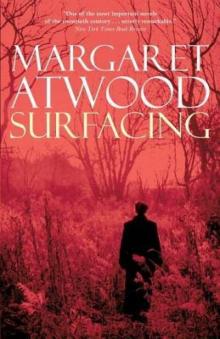 Surfacing
Surfacing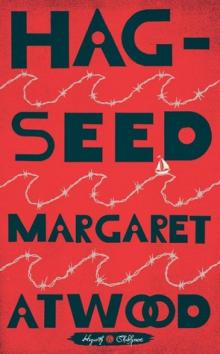 Hag-Seed
Hag-Seed Oryx and Crake
Oryx and Crake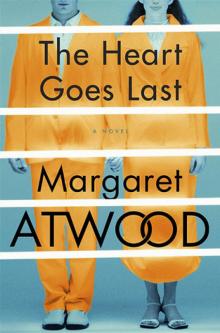 The Heart Goes Last
The Heart Goes Last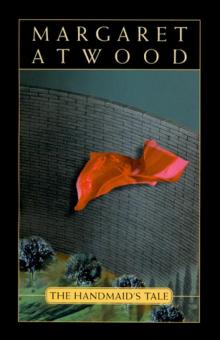 The Handmaid's Tale
The Handmaid's Tale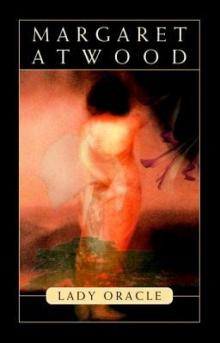 Lady Oracle
Lady Oracle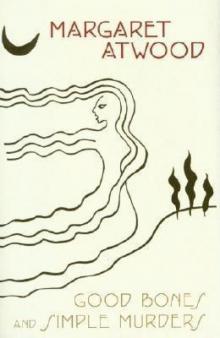 Good Bones and Simple Murders
Good Bones and Simple Murders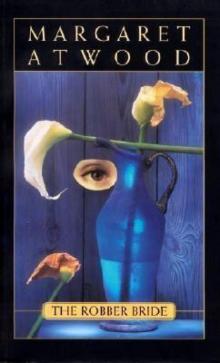 The Robber Bride
The Robber Bride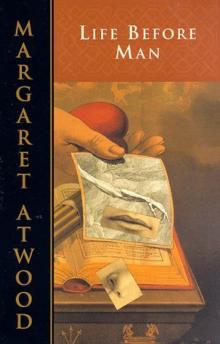 Life Before Man
Life Before Man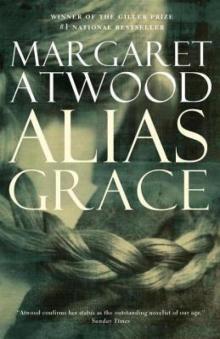 Alias Grace
Alias Grace The Blind Assassin
The Blind Assassin Cat's Eye
Cat's Eye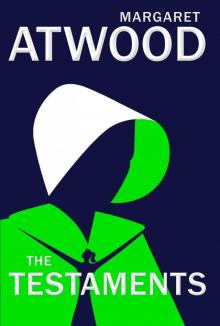 The Testaments
The Testaments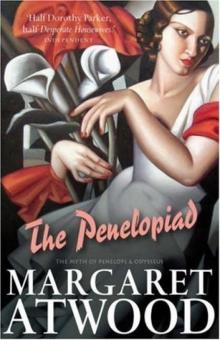 The Penelopiad
The Penelopiad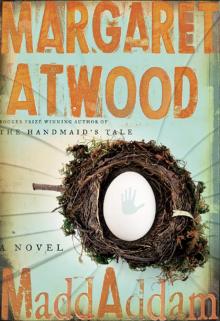 MaddAddam
MaddAddam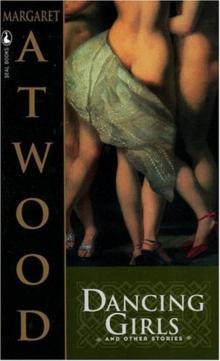 Dancing Girls & Other Stories
Dancing Girls & Other Stories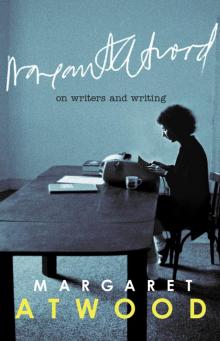 On Writers and Writing
On Writers and Writing Selected Poems II (1976-1986)
Selected Poems II (1976-1986) Wilderness Tips
Wilderness Tips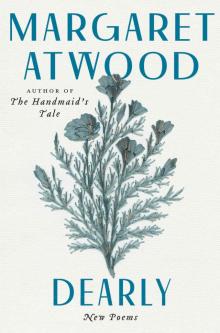 Dearly
Dearly The Tent
The Tent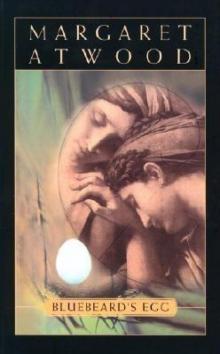 Bluebeard's Egg
Bluebeard's Egg The Edible Woman
The Edible Woman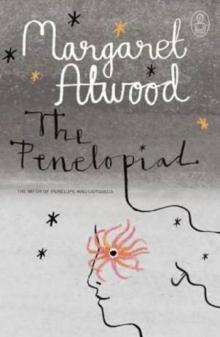 The Penelopiad: The Myth of Penelope and Odysseus
The Penelopiad: The Myth of Penelope and Odysseus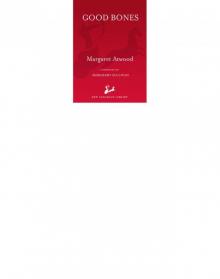 Good Bones
Good Bones I Dream of Zenia with the Bright Red Teeth
I Dream of Zenia with the Bright Red Teeth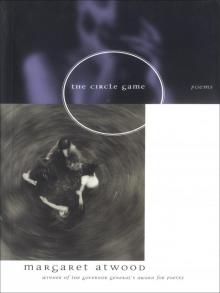 Circle Game
Circle Game Choke Collar: Positron, Episode Two
Choke Collar: Positron, Episode Two Stone Mattress: Nine Tales
Stone Mattress: Nine Tales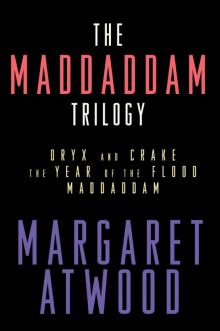 The MaddAddam Trilogy
The MaddAddam Trilogy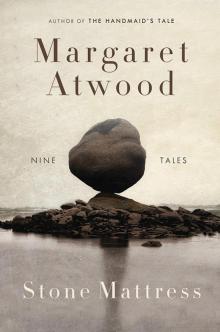 Stone Mattress
Stone Mattress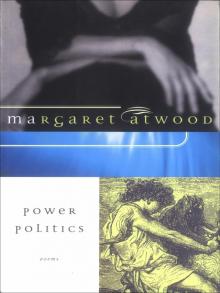 Power Politics
Power Politics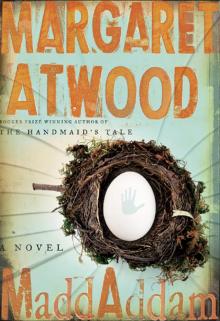 MaddAddam 03 - MaddAddam
MaddAddam 03 - MaddAddam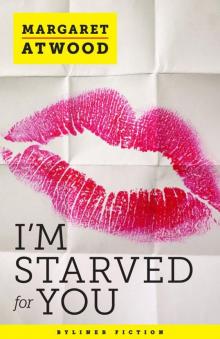 I’m Starved for You (Kindle Single)
I’m Starved for You (Kindle Single) Murder in the Dark
Murder in the Dark In Other Worlds
In Other Worlds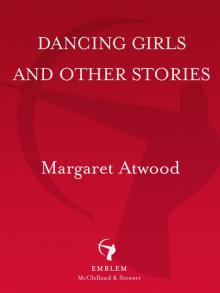 Dancing Girls
Dancing Girls Moral Disorder
Moral Disorder